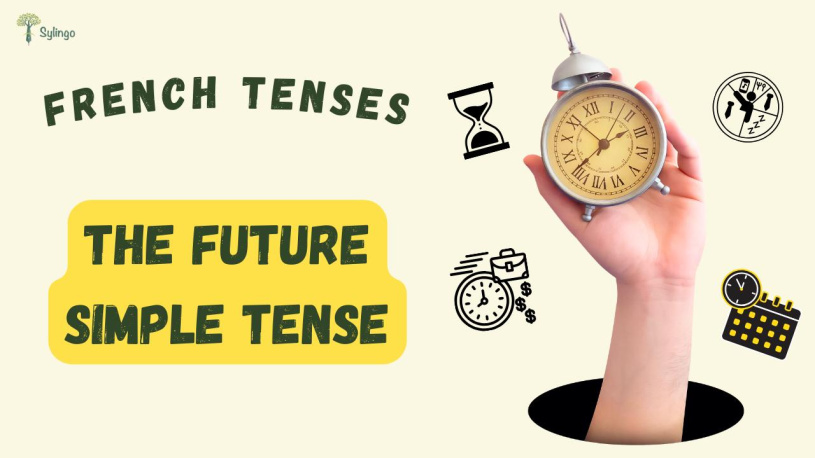The simple future (Le futur simple) refers to an action that will happen at some point in the future. It is used to express an action or event that will occur later, meaning it has not happened yet at the moment we are speaking.
When do we use the simple future?
-
To express a goal, desire, or intention for the future.
-
To express an assumption about the future.
How to form the simple future (Le futur simple):
We take the infinitive form and add the following endings:
|
ai |
je |
|
as |
tu |
|
a |
il / elle |
|
ons |
nous |
|
ez |
vous |
|
ont |
ils / elles |
Example for verbs of the first group (aimer - to love):
|
aimer - to love |
|
|
aimerai |
je |
|
aimeras |
tu |
|
aimera |
il / elle |
|
aimerons |
nous |
|
aimerez |
vous |
|
aimeront |
ils / elles |
Example for verbs of the second group (finir - to finish):
|
finir - to finish |
|
|
finirai |
je |
|
finiras |
tu |
|
finira |
il / elle |
|
finirons |
nous |
|
finirez |
vous |
|
finiront |
ils / elles |
Example for verbs of the third group:
Note: We remove the 'e' from the end of verbs of the third group before adding the endings of the simple future.
|
mettre - to put |
|
|
mettrai |
je |
|
mettras |
tu |
|
mettra |
il / elle |
|
mettrons |
nous |
|
mettrez |
vous |
|
mettront |
ils / elles |
Irregular cases:
Verbs like "être" and "avoir" are considered irregular and need to be memorized and focused on, as we will use them as auxiliary verbs in the future perfect (le futur antérieur).
Pronom
Avoir (aur)
je
aurai
tu
auras
il/elle
aura
nous
aurons
vous
aurez
ils/elles
auront
Pronom
être (ser)
Je
Serai
Tu
Seras
Il/elle
Sera
Nous
Serons
Vous
Serez
Ils/elles
Seront
Exceptions:
1- For verbs ending in (yer), we replace (y) with (i).
|
nettoyer - to clean |
|
|
nettoierai |
je |
|
nettoieras |
tu |
|
nettoiera |
il / elle |
|
nettoierons |
nous |
|
nettoierez |
vous |
|
nettoieront |
ils / elles |
2- For verbs ending in (eter) or (eler), sometimes we double the letter (t) or (l).
|
appeler - to call |
|
|
appellerai |
je |
|
appelleras |
tu |
|
appellera |
il / elle |
|
appellerons |
nous |
|
appellerez |
vous |
|
appelleront |
ils / elles |
3- For verbs ending in (eter) or (eler), sometimes we replace (e) with (è).
|
acheter - to buy |
|
|
achèterai |
je |
|
achèteras |
tu |
|
achètera |
il / elle |
|
achèterons |
nous |
|
achèterez |
vous |
|
achèteront |
ils / elles |
| French | Verbes |
|---|---|
| aller | je irai |
| faire | je ferai |
| savoir | je saurai |
| pouvoir | je pourrai |
| voir | je verrai |
| venir | je viendrai |
| recevoir | je recevrai |
| asseoir | je m'assoirai |
| devoir | je devrai |
| vouloir | je voudrai |
| falloir | il faudra |
| pleuvoir | il pleuvra |
And with this, we have finished with the simple future, understanding how to form it, when to use it, and how to conjugate it. We will continue with the other tenses in the upcoming articles.
If you have any questions or inquiries, you can write them in the comments, and I will be happy to respond.





